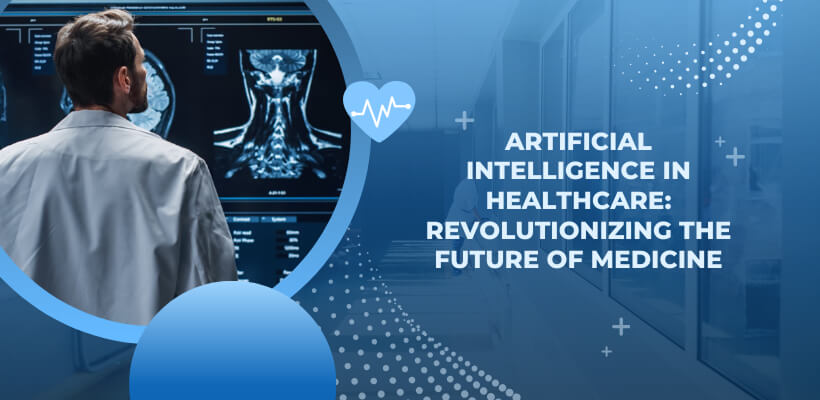 1-800-805-5783
1-800-805-5783 
Artificial intelligence (AI) has emerged as a groundbreaking technology with immense potential to transform the healthcare industry. From diagnosis and treatment planning to drug discovery and administrative tasks, AI is revolutionizing the delivery of healthcare services and enhancing patient outcomes. In this comprehensive guide, we will explore the various applications of AI in healthcare, examples of artificial intelligence in healthcare, and the challenges that need to be addressed for its widespread adoption.
Artificial intelligence, often referred to as machine intelligence, is the simulation of human intelligence in machines that are programmed to think and learn like humans. In healthcare, Artificial intelligence algorithms analyze vast amounts of data, identify patterns, and make predictions to assist healthcare providers in decision-making processes. The integration of Artificial intelligence in healthcare has the potential to fundamentally revolutionize the industry by improving diagnostics, treatment planning, and patient care delivery.
One of the most promising examples of artificial intelligence in healthcare is the analysis of medical imaging data. AI algorithms, now more advanced due to the maturation of deep learning, can analyze radiological images, such as X-rays, CT scans, and MRIs, to detect abnormalities and assist in disease diagnosis. AI-powered algorithms have demonstrated remarkable accuracy in detecting conditions such as breast cancer in mammograms, with some studies showing performance comparable to that of senior radiologists.
Furthermore, these AI systems are now being utilized for real-time analysis during procedures and to automatically triage urgent cases within a radiologist’s workflow, significantly reducing diagnosis time and enabling professionals to create more accurate treatment plans.
AI continues to play a crucial role in early disease detection and treatment planning. By analyzing patient data, including electronic health records and genetic profiles, AI algorithms can identify individuals at high risk of developing certain conditions. This enables healthcare providers to intervene early, implement preventive measures, and personalize treatment plans for better patient outcomes.
In 2025, artificial intelligence trends in healthcare are moving toward predictive analytics, utilizing wearable data, which will enable more personalized and continuous health monitoring.
Personalized medicine is a key focus in healthcare, and AI is the driving force behind its progress. Artificial intelligence in healthcare technologies can analyze vast amounts of patient data and generate personalized treatment recommendations based on a patient’s unique genetic makeup, lifestyle, and environmental factors. This approach is proving to be more effective with fewer adverse effects.
For example, AI is being used to determine the most effective drug combinations for complex diseases, such as cancer, by analyzing an individual patient’s genetic characteristics, ultimately leading to more precise, targeted, and successful therapies.

AI-powered predictive analytics can identify individuals at high risk of developing certain diseases with a high degree of accuracy. By analyzing a combination of medical records, lifestyle factors, and genetic information, AI can predict the likelihood of future health events, including heart attacks and diabetes. This enables proactive care and preventive measures, resulting in enhanced patient outcomes and driving growth in the global artificial intelligence in healthcare market.
AI algorithms analyze large datasets to help healthcare organizations optimize resource allocation and improve patient care. By predicting patient volumes, disease outbreaks, and resource utilization, AI assists in strategic planning, ensuring that facilities have the necessary staff, equipment, and supplies to meet patient needs efficiently. This leads to improved patient care and cost savings.
AI technologies analyze population-level data, including demographics, environmental factors, and health behaviors, to identify individuals at risk and develop targeted interventions. By predicting disease prevalence and identifying social determinants of health, AI enables healthcare organizations to implement preventive measures and enhance overall population health.
The process of developing new drugs is time-consuming and expensive. However, the application of artificial intelligence in healthcare can significantly accelerate drug discovery by analyzing vast amounts of scientific literature, clinical trial data, and molecular structures.
In particular, generative AI models are now being used to create novel molecular structures with desired properties, dramatically expanding the chemical space researchers can explore. Beyond molecular design, AI is also streamlining patient recruitment for clinical trials by analyzing electronic health records to identify eligible participants quickly. Furthermore, it is being used for real-time data analysis during trials to identify emerging trends and potential safety issues.
AI technologies analyze genomic data to identify genetic variants associated with specific diseases or responses to certain drugs. This information is then used to develop targeted therapies that are more effective and have fewer side effects. This approach enables the development of personalized treatment plans, thereby improving patient outcomes and revolutionizing medicine.
Monitoring the safety of drugs and identifying adverse events is a critical aspect of healthcare. Artificial intelligence in healthcare technologies can analyze large-scale healthcare data, including electronic health records and social media posts, to detect patterns and signals of potential adverse events related to specific medications. This can enable early detection and intervention, improving patient safety and more effective pharmacovigilance practices.
Virtual assistants and chatbots powered by Artificial intelligence in healthcare can revolutionize patient engagement and education. These tools give patients real-time access to healthcare information. They can answer frequently asked questions and offer personalized health recommendations. LLMs are being explored for their ability to provide more natural interactions. They can empower patients with knowledge and support.

The use of artificial intelligence in healthcare extends beyond clinical tasks. AI technologies are now automating scheduling, billing, and claims processing, enabling healthcare organizations to reduce administrative costs, enhance accuracy, and allocate staff resources more effectively for patient care.
AI algorithms are being trained to analyze patient-reported symptoms and provide preliminary assessments and recommendations. Chatbots equipped with symptom assessment capabilities can ask patients questions, analyze their responses, and provide initial guidance on the severity of their symptoms. This enables patients to make informed decisions about seeking medical care, reducing the burden on healthcare systems.
The healthcare industry is burdened with numerous administrative tasks. Artificial intelligence in healthcare technologies can automate various administrative tasks, including appointment scheduling, medical coding, and billing. The advent of ambient listening technology enables AI to listen to and analyze patient-provider conversations in real-time, automatically generating clinical notes and reducing the documentation burden on clinicians.
AI plays a crucial role in improving revenue cycle management. By analyzing financial data, insurance claims, and payment patterns, AI algorithms can identify potential billing errors, reduce claim denials, and optimize reimbursement processes. This not only improves financial performance but also ensures accuracy and compliance.
Supply chain management is critical to healthcare operations, ensuring that healthcare organizations have the necessary medications, equipment, and supplies to deliver quality patient care. AI technologies can analyze supply chain data, predict demand patterns, and optimize inventory management to enhance operational efficiency. By preventing stockouts, reducing waste, and improving procurement processes, AI can enhance supply chain efficiency and contribute to cost savings in healthcare organizations.

While the potential benefits of artificial intelligence in healthcare are immense, significant challenges must be addressed for its widespread adoption and implementation.
The use of artificial intelligence in healthcare necessitates access to substantial amounts of patient data, which raises concerns about data privacy and security. Implementing robust data protection measures, ensuring secure data-sharing protocols, and complying with relevant privacy regulations is crucial. The need for a balance between data access for model training and patient privacy is a critical ongoing discussion.
AI systems can be susceptible to bias if the data they are trained on is not representative of the population they serve, which can lead to unfair or inaccurate results, particularly for marginalized communities. It is essential to address bias in AI algorithms, ensure diverse and inclusive datasets, and regularly evaluate the performance of AI systems to promote equity in healthcare.
Many AI systems in healthcare are still considered “black boxes,” making it challenging to understand how they arrive at specific decisions. This lack of transparency can undermine trust. The development of explainable AI (XAI) frameworks, which enable the understanding and validation of the reasoning behind AI-generated recommendations, is a top priority.
The rapid advancement of artificial intelligence in healthcare has outpaced the development of clear regulatory frameworks. Comprehensive guidelines and regulations are essential to ensure the responsible and ethical use of AI technologies. Regulators should collaborate with healthcare organizations, technology developers, and experts to develop frameworks that address the unique challenges and risks associated with AI in healthcare.
To fully harness AI’s potential in healthcare, it is crucial to promote AI literacy and education among healthcare professionals and patients. Healthcare professionals must understand the capabilities and limitations of AI technologies to integrate them into their practice effectively. Similarly, patients should be educated about AI-driven healthcare solutions to make informed decisions and actively participate in their own care.
Artificial intelligence in healthcare holds tremendous promise for transforming the future of medicine. From enhancing diagnosis and treatment planning to improving administrative efficiency, AI technologies have the potential to revolutionize healthcare delivery and improve patient outcomes. However, addressing challenges related to data privacy, bias, transparency, regulation, and education is crucial for the responsible and effective implementation of artificial intelligence in healthcare. By working collaboratively, healthcare organizations, regulators, and technology developers can unlock the full potential of AI to revolutionize healthcare and improve lives.
The most significant recent development is the rise of Generative AI and large language models (LLMs). These technologies are being utilized for a wide range of applications, from accelerating drug discovery by designing new molecules to automating clinical documentation and improving patient-provider communication.
AI enhances medical imaging by utilizing sophisticated algorithms to analyze images, such as X-rays and MRIs. These tools can identify subtle patterns and abnormalities, assist in triaging urgent cases, and sometimes detect diseases like cancer earlier and more accurately than a human alone.
No, AI cannot replace doctors. Instead, it serves as a powerful tool to assist them. AI can automate routine tasks, provide data-driven insights, and assist with diagnoses, but human professionals remain essential for critical thinking, ethical decision-making, and delivering compassionate patient care.
The biggest challenges include ensuring data privacy and security, mitigating algorithmic bias to provide equitable care, and establishing clear regulatory frameworks for the safe and ethical use of AI technologies.
Yes, when developed and appropriately regulated, AI-driven medicine is considered safe and effective. Regulatory bodies, such as the FDA, are increasingly involved in reviewing and approving AI medical devices. The focus is on ensuring these tools are transparent, reliable, and undergo rigorous testing to guarantee patient safety and efficacy.
At [x]cube LABS, we craft intelligent AI agents that seamlessly integrate with your systems, enhancing efficiency and innovation:
Integrate our Agentic AI solutions to automate tasks, derive actionable insights, and deliver superior customer experiences effortlessly within your existing workflows.
For more information and to schedule a FREE demo, check out all our ready-to-deploy agents here.